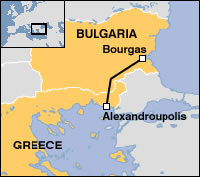Plans to build a trans-Balkan oil pipeline from the Black Sea to the Mediterranean have been approved by Russia, Bulgaria and Greece.
The 285km (178-mile) pipeline will go overland from Bulgaria's Black Sea port of Bourgas to the northern Greek town of Alexandroupolis on the Aegean.
The aim of the pipeline is to allow Russian crude exports to sidestep the congested Bosphorus Strait.
Separate ships will instead unload at Bourgas and fill up at Alexandroupolis.
BP involved
Russian, Bulgarian and Greek ministers signed a memorandum of understanding supporting the project, which it is estimated will cost $750m-800m (£400m-424m).
Private firms nominated from the three countries will now work to set up a consortium to gain the necessary financing and start the construction of the pipeline.
The Kremlin has already announced that UK oil firm BP's Russian joint venture TNK-BP will coordinate the project, together with Russian gas monopoly Gazprom, oil giant Lukoil and pipeline business Transneft.
The pipeline is expected to have an initial capacity of 300,000 barrels of crude oil per day, rising to 700,000 per day over three years.
'Complex project'
The construction is timetabled to open in 2008.
"This is a very important first step for the implementation of this complex infrastructure project," said Bulgarian regional development minister Valentin Tserovski.
At least a third of Russian oil exports currently leave by tanker ship via the Black Sea and the Bosphorus Strait, which runs between European and Asian Turkey.
Moscow has long proposed an overland alterative due to the regular delays caused by ships having to queue before they can go through the busy and narrow Bosphorus.




 By: N. Peter Kramer
By: N. Peter Kramer
